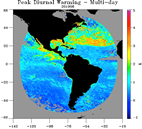Use of Modern Geostationary Data to Improve a Global Diurnal Warming Model for Multi-Satellite Data Fusion
Research Topic:
Data Fusion and Algorithm Development
Task Leader:
Andrew Harris
Sponsor:
NOAA ROSES
Published Date:
11/10/2020

The ocean surface undergoes a diurnal cycle of heating which may be several kelvin in magnitude under conditions of high insolation and light winds. Optimal combination of sea surface temperature (SST) data from different satellite instruments requires accounting for the magnitude of the cycle at each observation time throughout the day. In recognition of this, a diurnal cycle correction has been implemented in a version of NOAA’s operational Geo-Polar Blended SST Analysis (Maturi et al., 2017). However, despite the use of state-of-the-art turbulence modeling, obtaining a globally consistent calculation has proved very challenging. In this project, we will exploit the latest generation of high-quality geostationary SST observations in the development and validation of a new version of the diurnal model. The improved model will be integrated into the operational processing chain for the Geo-Polar Blended SST, and the code and documentation will also be made available to Eumetsat under the EUMETSAT-NOAA Science cooperation project. Finally, model output and satellite diurnal warming observation datasets will be made available to the wider scientific community, along with model code and documentation.